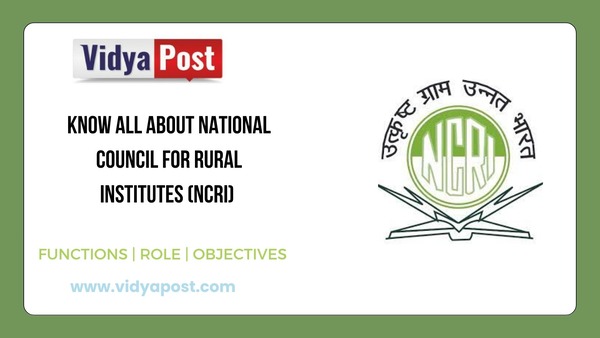Know all about National Council For Rural Institutes (NCRI) - Functions Role Objectives

The National Council of Rural Institutes is an autonomous society that is fully funded by the Government of India's Ministry of Human Resource Development. Curricula for higher education programmes given by Indian universities and independent institutions are developed, implemented, and promoted by the National Council of Rural Institutions. Through Higher Education interventions, NCRI strives to promote resilient rural India.
Other council goals include teacher training, extension, and research through collaboration with policy-making bodies such as UGC and AICTE, as well as research organisations such as CSIR, AICTE, and others as well as encouraging other educational institutions and voluntary organisations to develop Gandhian education philosophy.
Also, Read All know about AICTE
HISTORY
It was founded on October 19, 1995, with the main goal of promoting rural higher education for the advancement of rural livelihoods through the instrument of education based on Mahatma Gandhiji's groundbreaking idea of Nai Talim, a practical education based on his beliefs, is credited with revolutionising education.
Assisting rural institutions, Gandhian organisations, NGOs, universities, and government organisations in various programmes related to the promotion of rural higher education, has sparked change in many areas of the nation. A requirement in post-independence India The Council was formed at a critical juncture in history. People yearned for value-based education that encouraged peace and cooperation, health and sanitation, environmental management, entrepreneurship development, and the promotion of rural livelihood options after independence.
The basic idea was to train students from rural backgrounds for rural development programmes throughout the country. To continue Mahatma Gandhi's vision of Basic Education, the state agreed to establish a new system of rural universities as part of the National Policy on Education (NPE) of 1986. (Nai Talim). Nai Talim was seen by Gandhiji as having the ability to lead a social revolution that would improve relations between the metropolis and the villages. On October 19, 1995, the National Council of Rural Institutions (now known as the Mahatma Gandhi National Council of Rural Education) was officially registered as an organisation under these conditions. Source
ROLE OF NCRI
-
To develop, create, and promote the curricula for higher education programmes provided by Indian universities and independent institutes.
-
To promote resilient rural India through interventions in higher education.
-
Priority areas for NCRI include social work, education, rural studies, and rural development.
-
Higher education curriculum development addresses the needs of underserved rural areas and their representative higher educational institutions.
-
Expanding popular social and rural development programmes with an emphasis on Swachh Bharat, skill development, employment, and livelihoods are among the main goals.
-
To improve the rural higher education curriculum and the faculty members who teach it.
FUNCTIONS OF NCRI
-
To research rural society and rural economy to solve the requirements and problems of development through participatory processes and suitable technological solutions based on local resources.
-
To collaborate with institutions of higher learning in the natural and social sciences, management sciences, and engineering to create curricula that address issues facing rural communities in terms of locating suitable technology options to promote just and equitable economic and social development.
-
To use an interdisciplinary approach and collaborate with faculty and postdoctoral fellows through workshops to address the problems facing rural communities in locating suitable social and economic responses in line with local and global potential for livelihoods.
-
To create a network of academics and researchers from various disciplines who are interested in and working for rural areas, utilising scholarly inputs for higher education.
-
To conduct studies on the problems and barriers that the Indian government's efforts to develop human resources in rural areas face, to examine success and failure stories, and to improve the programmes and their execution through curriculum modifications in higher education.
-
To collaborate with higher education institutions, local governments, development agencies, gram sabhas, and industry to create a synergistic convergence of human resources that are socially and economically just and inclusive of the vulnerable sections of rural India.
-
The NCRI divides the nation into six areas and collaborates with Central and State Universities, Central and State Institutes, and Central and State Institutions in each zone.
-
NCRI promotes "nationally coordinated projects," "regionally coordinated projects," "projects by network partners," and fellowship-based study projects to complement the work it has started.
-
NCRI projects are scrutinised, approved, and monitored by professional committees of experts that are specially formed each year to do so. Source
THE MISSION
Establish and acknowledge curriculum components, as well as recognised programmes and higher education establishments, to support the creation of rural livelihoods that are sustainable and climate resilient.
CONCLUSION
The National Council of Rural Institutes, founded on October 19, 1995, is an independent body funded by the Government of India's HRD Department. The major reason for creating this organisation was to encourage and support higher education in rural areas to improve the quality of life for rural residents. The institute seeks to educate rural residents by following the example set by Mahatma Gandhi and his ground-breaking idea known as "Nai Talim."
Also, Read All about the Bar Council of India (BCI)
Share:

2 Comments
Jordan Singer
2d2 replies
Santiago Roberts
4d